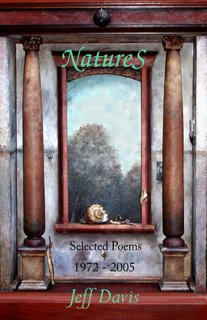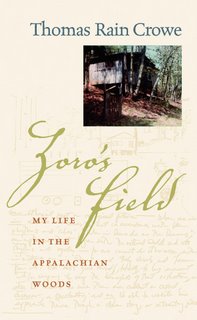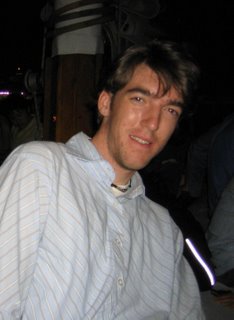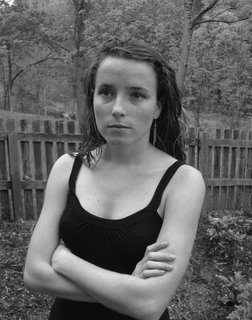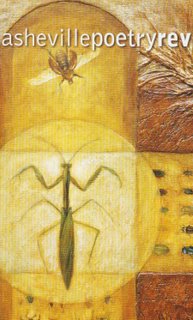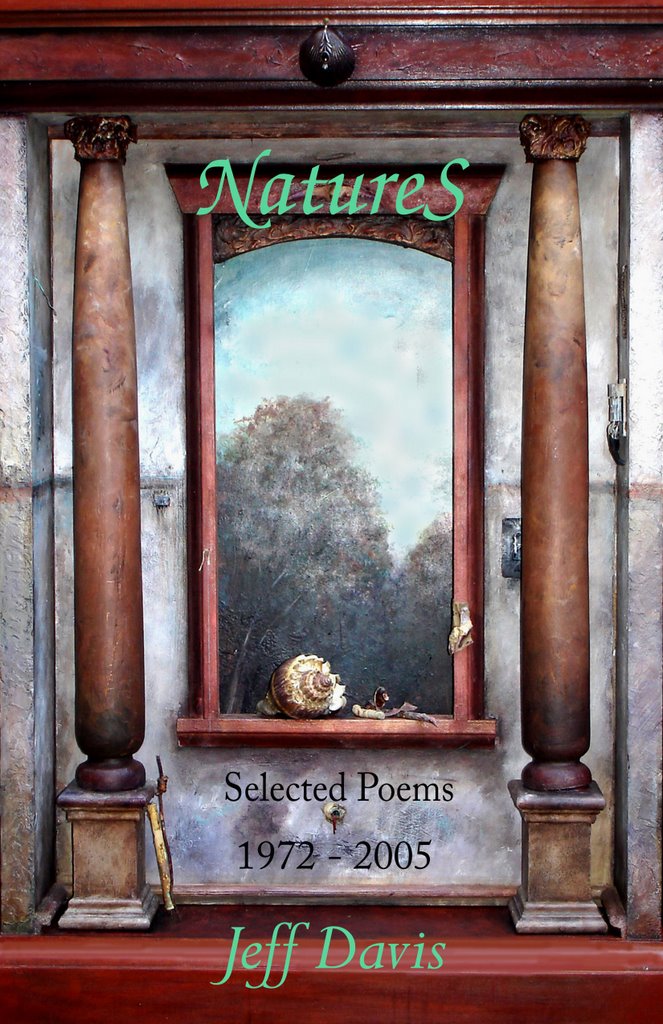
... at
Malaprops, in downtown Asheville. His
Zoro's Field has gone into paperback, and Thomas will be reading from it to celebrate. The reading will begin at 7:00 pm.
In July, Thomas was interviewed by Floriano Martins, of Brazil, ostensibly about his views on "Surrealism in the Americas," something Thomas knows a bit about, but the interview ranged into other territories, and found Thomas talking about many of the sources and inspirations for his own work. The interview has now been published, in Portugese, in the online magazine
Agulha. Here, with thanks to Thomas for the transcription, is the complete interview in English:
~~~~~~~~~~~~~~~~~~~~~~~~~~~
FM: So you made the connection between your fascination for Beats and Surrealism? Breton defended the existence of a “free integral thought.” Did the Beats also? Which were the points in common?
TRC: Yes, it was the "free integral thought", as you call it, that was the most important thing for me in terms of both Beat literature and French surrealism. On the Beat side, it was essentially the dictum of "first thought, best thought," which was espoused by Kerouac that was critical. On the French side, Breton took it a little further, and dogmatically, into the subconscious, with restrictions regarding content that was "of the world". I think he was more interested in the other world(s) than in the one in which he was living. And his Manifesto was an attempt to impose that perspective on his fellow surrealist colleagues, if not the world in general. My take was that while Kerouac was living in the world, and was of the world, Breton was living mostly in his head.
FM: You speak in a relationship to the Celtic tradition, a theme that would have given to you a larger intensity between voice and text. A poet as Robert Graves woke up some interest for your poetry? Besides the approach to Beats, which were the poets that you read most?
TRC: Let me begin by answering the second part of your question first, as it relates to your previous question. My discovery of the Beats was the "wake up call" for me when I was still in my teens. Soon thereafter, I discovered the poetry of Yevgeny Yevtushenko and Andrei Vosnesensky in Russia (The Soviet Union). They were, more or less, writing in a similar tradition and voice to the Beats. In researching those two poets, I also discovered many Russian poets from an earlier generation. Mayakovsky, Esenin, Khlebnikov, Krushchenek, Pasternak, Mandelstam. And among the women: Akhmatova, Tsvetayeva and Akhmadulina. The Russian "Futurists," especially, got my attention.
About this same time, I was discovering the work of the French. Rimbaud, Baudelaire, Lautremont, Bachelard, Voltaire, Fournier, Balzac, Artaud. These French writers, along with the French surrealist painters, had a bigger influence on me than Breton or the surrealist writers.
So, this "trinity" of the Russians, French and Beats was/is truly what formed my own "oeuvre" early on, and still does to some extent, even today.
As to the Celtic tradition. This is something that I have come upon rather recently. I made my first trip abroad to Wales in 1993 – to visit the hometown of Dylan Thomas, whom I consider to be the greatest poet of the 20th century writing in the English language. This trip to Laugharne, Wales was something of a pilgrimage for me. During that first visit I was exposed to the breadth and depth of the Welsh literary tradition, and was taken in by that. I had the opportunity to meet with one of the great contemporary Welsh poet/writers, Bobi Jones. Bobi Jones put me on the track of other Welsh poets, as well as books on the Welsh tradition. This was my beginning introduction to things Celtic.
From there, I went, in 1995 up into Scotland (where all of my ancestry originates). I met with contemporary poets such as Scottish Gaelic poet Aonghas MacNeacail in Edinburgh, and Tessa Ransford at the Scottish Poetry Library. From these meetings I began my study of Scottish Gaelic and the Scots traditions.
That same year, I went over to Ireland. I hooked up with people at Poetry Ireland and visited several bookstores both in Dublin and, in the west, in Galway. After a lot of reading and after a lot of Guinness, I was off and running. Two years later and two more trips to Wales, Scotland and Ireland, and I had collected, edited and published the first comprehensive contemporary bi-lingual anthology of Celtic languages poets from the Celtic communities of Wales, Ireland, Scotland, Brittany, Cornwall and the Isle of Man. This anthology has been a big hit in the Celtic countries, as it successfully unified the clans–something that not even Bonnie Prince Charlie could do! The book is also, now, used as a textbook in several Celtic Studies Programs at universities in the U.S. and Canada.
What I took from all of this, was mainly a love of lyric verse, and have incorporated this element into my own work.
FM: How was your coexistence with the music? What music type? And how did your poetry benefit with this coexistence?
TRC: As my work got more and more lyrical following my trips to the British Isles, I found that the idea of the Bardic tradition became of interest to me. In the olden times in those Celtic traditions, poetry was very often recited with musical accompaniment. I wanted to explore this and to give my poetry a bigger and more complete sound. In 1991 I formed a band of musicians and began performing spoken poetry with music. In the process, I created a record label (Fern Hill Records) devoted exclusively to the collaboration of poetry and music. I have produced, now, several recordings in this genre – using my own work and work of other poets, as well. Most recently my band The Boatrockers and I have been performing a kind of Middle Eastern music to accompany my translations of the 14th century Sufi poet Hafiz. But we also, on occasion, venture off into other musical areas, as well as into political poetry – which seems necessary to me, given the political climate in the U.S. at the present time.
FM: You speak about your writing as a spontaneous process. Is it here possible to speak in a systematic and passionate exploration of the unconscious, as it defended the surrealism? Was your idea of an automatic writing given firstly by Kerouac?
TRC: As I mentioned before, Kerouac's "first thought, best thought" was, and is a dictum that I have followed. Poetry, for me, has always been about "the magic." The process, as well as the product, is a mystery. Where it comes from and even what it (the poem) is about, is part of this magic, this mystery. In essence, I just open the windows and the doors and let it (the poem) in. I don't know whether my poems come from the unconscious or from the outside world. All I know is that they come into and through me from an "other" place. Breton and the surrealists talk a lot about the "other." It's not clear what the "other" is, but it is definitely not the rational mind. The rational mind is the creator of prose. Poetry is not prose. The Beat generation poet, and one of my mentors from my years in San Francisco during the 1970s, Jack Hirschman wrote an essay many years ago titled "No Such Thing As Prose." In this essay he attempted to delineate the differences between prose and poetry. In the end, he sided with poetry as the purer vehicle for the transmission of ideas through language. I would agree with him in this assessment. Although I write a good deal of prose these days in order to make my living, when I write poetry it is an entirely different process than when I am (consciously) writing prose.
FM: Do the readings in public precede, in your case, the publication of poems in magazines or books? Did the direct contact with the public somehow wake up in you a fascination for the theater?
TRC: Sometimes my poems appear in publications before I actually perform them in public. And sometimes not. I have no set formulae for all that. A lot of it is out of my control – the timing of such things. I can tell you that in performing my poems in public that there is an organic editing process that goes on much of the time. I learned this from Lawrence Ferlinghetti, who often reads a new poem in public and edits it right on the spot. He's concerned about how his ear perceives things as they are spoken. I've come to do the same thing. If something in a new poem sounds strange in the reading, I will often change or edit it out of the piece, later.
During the 1970s in San Francisco, which is where I really cut my teeth as a public poet, I got my indoctrination and initiation into the theatrical side of the poet's work. I was shy and unskilled at public performance, at first, but the more I read in public, the easier it got. And the easier it got, the more experimental was my approach to all of this. Jack Hirschman had translated a collection of Artaud's work, and was more or less acting out Artaud's notions of absurd and political theatre in his day-to-day life. His appearance and his poetry performances were riveting, electric. I learned a lot from just being around and watching Jack. I learned a lot about projecting one's voice from watching and listening to him. This has served me well, as in later years I've become more and more of a public performer with bigger and bigger bands. Of, when possible, we combine art forms and our performances are multi-media. In the spirit of Wagner's notion of "Gesamtkunstwerk" (total art work), often The Boatrockers performances will include not only music and spoken language, but visual lighting, projections, and live dancers, as well. In this sense, poetry has become theatre, as you imply.
FM: Today it is possible to speak in a literary family in relation to your poetry or is this a theme that doesn't wake up you interest?
TRC: I'm pretty much a renegade, an outlaw, as a poet. At least this is how I've spent my poetic life these past 25 years, since leaving San Francisco and my work with the Beatitude group and the Beats. However, I still consider myself to be part of that "family" as you call it, and part of the Beat tradition. While I don't really like labels, and am not prone to join groups, I maintain a loyalty to that tradition and to those poets whom I befriended during the 1970s, and whom have remained friends, if not cohorts. I believe that the Beat movement was more than a flash-in-the-pan that only happened for a short time among a small group during the 1950s. My generation was directly influenced by the Beats. Especially those of us who were living in San Francisco and hanging out with them, working with them on publication projects and performing with them in public readings. Their literary values and ideas were literally handed down to us "Baby Beats" during the 1970s, and now, we have passed on those values, that tradition to a whole new generation of "grandbaby Beats", if you will. So, it's ongoing. Or, as the saying goes: "the Beat goes on ..."
FM: Besides Lamantia, which other surrealist American poets you consider important?
TRC: The two poets whom I know the best are Ken Wainio and Jerry Estrin. Both of these poets lived in San Francisco when I was there during the 1970s. Jerry Estrin was founding editor of a surrealist magazine called Vanishing Cab, which, for my money, was the best surrealist publication in the U.S. during those years. He and Ken Wainio had a joint book of poems published by Sternum Press during the 70s called My Nakedness Creates You. Jerry, who was a cab driver during his years in San Francisco, went on to publish four more collections of poetry before dying at the age of 47 in 1993.
Ken Wainio, as a young poet in San Francisco in the 1970s, who was also making his living as a cab driver, was recognized and hailed by both Philip Lamantia and Nanos Valaoritis for his early poems. He was part of Harold Norse's workshops, where most of the Baby Beats originally met and began working together. He was pursued by the Chicago Surrealist Group, but didn't join them. Writing a surrealist poetry that was heavy with mythic content (especially Egyptian and Mycenean), his work is considered by many to be a unique mix of humor, satire and serious historical observation. His first solo book published in 1993 titled Crossroads of the Other, by Androgyne Books in San Francisco, is now considered a classic. In later years, he wrote more prose than poetry, including three novels, only one of which (Starfuck) was published before his untimely death in January of this year (2006).
Both Wainio and Estrin were involved with Beatitude magazine. Wainio edited issue #26 which came out in 1976.
The other surrealist poet that comes to mind is Franklin Rosemont, who is the founder and central figure in the Chicago Surrealist Group. He is also founder of Black Swan Press. Since the late 1960s, he has been an instrumental and outspoken voice from the surrealist position in the U.S. And still remains so after almost 40 years as a staunch surrealist poet and activist.
I'm sure that there are others that one could cite, but in my mind these three are the most important, in the sense that their work will most likely stand the test of time.
FM: Did we forget something?
TRC: No, I think we've just about covered all the bases. At least enough to give your readers a little food for thought. I thank you for your interest in my work and the work of the Baby Beats. It's very exciting to know that there will now be an audience for our work in Brazil and in the Portuguese language. I hope that we will have many opportunities in the future to have similar conversations.
Labels: poets, Thomas Rain Crowe












